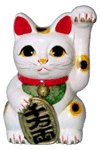![]() Maneki Neko まねねこ(招猫)
Maneki Neko まねねこ(招猫)

Japanese merchants are very superstitious. They always keep some kind of lucky charm, hoping for more customers and prosperous business. There are many kinds of lucky charms in Japan. The Seven Deities of Good Fortune which include Ebisu and Daikoku, Fuku Suke, Dharma, Otafuku, Tanuki are very popular. Among many, Maneki neko (literally “beckoning cat”) is the most popular lucky charm in Japan. The gesture of raising its paw is actually inviting customers, relationships, money, good fortune, or whatever you wish. The Japanese beckons by showing the palm of the hand. Americans beckon showing the back of the hand. The Maneki Neko reflects these cultural differences.
![]() More Music Styles - にほんのおんがく(日本の音楽): JPOP is Japanese popular music
More Music Styles - にほんのおんがく(日本の音楽): JPOP is Japanese popular music
SMAP : The boy band was very popular in the 1990s. One of singers Kimura Takuya (known commonly as “Kimutaku” is also a popular actor. Other members are often seen in variety shows on TV.
Female pop groups like Speed and Morning Musume sold millions of record in the late 1990’s.
R & B became popular in Japan in the late 90’s when a singer-songwriter, Utada Hikaru debuted with Automatic/Time Will Tell. Her first album First Love was the best selling Japanese album of all time. Other female solo singers, Oyumi Hamasaki, BoS, Mai Kurai, Ai Otsuka, Mika Nakashima and Ami Suzumi are also very popular.
R & B and Hip Pop continue to be very popular in Japan today. Orange Range and Ketsumeishi are the top of the charts. Older pop/rock group like Mr. Children, B’z and Southern All Stars are still active in music scenes. Ken Hirai is a solo male singer who is loved by Japanese of all ages.
![]() Comparative Practice
Comparative Practice
Let's practice more with comparisons. Compare the following items using the adjective given. Click each adjective to see the correct response in Japanese. Be sure to watch for the gender and number of the adjective.
| ねこ(猫)いぬ(犬) | おおきい(大い) | いぬは ねこより おおいです。 (犬は、猫より 大いです。) |
| ぞう(象)とら(虎) | ふっとっています(太っています) | ぞうは とらより ふとっています。 (象は、虎より 太っています。) |
| さかな(魚)かめ(亀) | はやい(早い) | さかなは かめより はやいです。 (魚は、亀より 早いです。) |
| ろば(驢馬)うま(馬) | ばか(馬鹿) | ろばは うまより ばかです。 (驢馬は、馬より 馬鹿です。 |
| とり(鳥)さる(猿) | きれい(綺麗) | とりは さるより れいです。 (鳥は、猿より 綺麗です。) |
| か(蚊)ちょう(蝶) | わるい(悪い) | かは ちょうより わるいです。 (蚊は、蝶より 悪いです。 |
![]() Graded Assignments
Graded Assignments
Please return to the Section 3 Tasks & Assignments folder to complete the graded assignments for Section 3, Part A.

